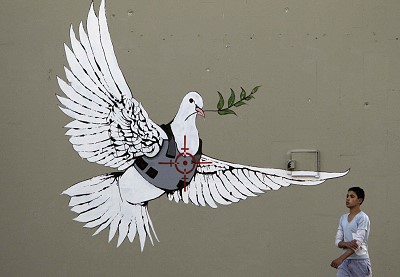Did Egypt know Israel’s intentions when it sealed the Rafah borders again on Thursday?
Once more Israel bombs tunnels between its Gaza concentration camp and the outside world.
Israel launched air strikes in Gaza late Friday to strike tunnels used to smuggle weapons and an arms depot in retaliation to Palestinian rocket attacks, an Israeli military spokesman said.
“Our planes attacked four tunnels that were dug under the border with Egypt and used for weapons smuggling,” the spokesman told AFP.
“An arms depot was also targeted and the explosives that were stocked there exploded,” he said, adding that the raids were “a response to the firing of two Palestinian rockets in the morning.”
Palestinian security forces and witnesses earlier said that Israeli planes had launched raids on targets in the Rafah sector, near the border with Egypt, without causing injuries.
The air strikes came hours after Palestinian militants fired two rockets at southern Israel without causing damage or victims, according to a military spokesman.
Palestinian militants have fired about 40 rockets and mortar rounds since Israel ended its 22-day military offensive against the Palestinian territory on January 18.
Israel, which launched its assault on December 27 with the stated aim of stemming rocket attacks, has warned of “the severest riposte” to any further rocket fire.
UNWRA suspends aid as it blames Hamas for ‘stealing’ its supplies.
In a statement, UNRWA said it had suspended aid deliveries to Gaza after the Hamas-run Ministry of Social Affairs stole 10 truckloads of flour and rice delivered to Gaza on Thursday. Earlier this week, Hamas police took thousands of blankets and food parcels meant for needy residents.
“Hamas has got to hand back all the aid that they have taken and they have to give credible assurances that this will not happen again. Until this happens, our imports into Gaza will be suspended,” said UNRWA spokesman Chris Gunness.
He said the agency, which maintains “working level contacts” with Hamas, had filed a protest with the government. Gunness said UNRWA would continue to distribute aid from its existing supplies in Gaza, but that stocks were running thin.
“There is enough aid for days, not weeks,” he said.
Some 80 percent of Gaza’s 1.4 million people rely on the U.N. agency for food or other support.
In Gaza, Hamas Social Affairs Minister Ahmed al-Kurd dismissed Thursday’s incident as a “misunderstanding” and expressed hope the dispute would soon be resolved.
“We welcome all aid, whether from UNRWA or international organizations,” he said. “Any international organization that wants to help or build in Gaza, we have no conditions, come to Gaza, and we will provide security, safety and calm,” he said.
The spat with Hamas created a challenge for UNRWA, which already has been pressuring Israel to ease its blockade of Gaza’s borders to allow more aid into the area.
Most cargo into Gaza comes through Israeli-controlled crossings. Israel has largely closed the crossings since Hamas seized control of Gaza in June 2007. Israel fears supplies will reach Hamas, which it considers a terrorist group.
More info about the stolen aid.
A Hamas spokesman attributed the most recent incident, on Thursday night, to a misunderstanding among truck drivers, and said that those who stole an earlier load from a United Nations distribution site were not part of Hamas. He said that Hamas and United Nations officials were meeting and that he expected the problem to be cleared up quickly.
De facto minister of Palestinian social affairs Ahamd Al-Kurd, however, claimed “There is no problem or issue between the de facto government and UNRWA.”
The comments came in response to UNRWA’s announcement that aid deliveries into the Strip would be halted after two thefts attributed to the de facto police and ministry.
In a statement Al-Kurd insisted that “The de facto government did not stop any of the UNRWA tucks.” And rather that the problem was some confusion over who was supposed to pick up the goods, the UNRWA transport or the de facto ministry; “between the drivers to identify the goods.”
He explained that the de facto government driver loaded nine trucks at the crossing on 5 February, and the UNRWA driver loaded 24 trucks, he said. When the mistake was discovered the de facto government issued instructions to identify the misplaced goods and return them to UNRWA.
The statement made no mention of a 3 February incident where UNRWA employees reported armed de facto government police took 3,500 blankets and 406 food parcels from a distribution store at Beach Camp in Gaza by police personnel.
Al-Au’ja admitted to Al-Jazeera, however, that the 3 February shipment was seized, saying that the aid should be more widely distributed to Gaza’s 1.5 million population.
The UNRWA staff had already reportedly refused to give supplies to the de facto Ministry of Social Affairs. During the incident police broke into the warehouse and seized aid by force.

What can be done to alleviate the extreme distress suffered by the Palestinian people as a result of the hideous Israeli Occupation?
As’ad Abdul Rahman points out some of the options available for Palestinian resistance:
Understandably, things have so much deteriorated that the Palestinian people considering peaceful resolution of the Palestinian problem are left with one of three valid immediate choices: 1) a national unity government; 2) dismantling of the PNA, or, 3) a third uprising, Intifada, through the declaration of a general peaceful civil disobedience.
This Intifada, however, could not start except after the achievement of national reconciliation that will strengthen the stand of the Palestinian people in the face of Israeli aggression. In this case, it is imperative that the Ramallah government, together with the police and security forces in the West Bank, engage peacefully in the general non-violent civil disobedience.
The Palestinian Security forces of the Ramallah government should not be deployed as instruments of oppression conforming to the “orders and wishes” of the US and Israel, neither should Palestinians engaged in the civil disobedience movement (including Hamas and its forces) resort to the carrying or use of arms in any way. It should be a civilised peaceful uprising, albeit thorough and massive.
The time is now ripe for the launching of a serious all-out resistance that would bring an end to the Israeli occupation and bring to realisation the independent sovereign Palestinian state with Jerusalem as its capital.
Australian Zionist bodies have their knickers in a knot over comments made by the notorious ‘women are cat meat’ Sheik al-Hilali and Australian Federation of Islamic Councils chairman Ikebal Patel analogising Israel’s attack on the Gazan people as a Holocaust.
Mr Patel said yesterday he stood by his comments, though he would regret it if the Jewish council cut ties.
He said he had spoken to the state Islamic councils, other Muslim groups and many imams, and was confident he represented the mainstream Muslim view.
But he said he did not mean Israel’s actions in Gaza were the same as the Holocaust. “I meant people who suffered so much (the Holocaust) should understand the impact of modern warfare and missiles and phosphorus bombs.”
He had urged both sides to show restraint in Gaza. “Hamas firing missiles is clearly not helping the problem.”
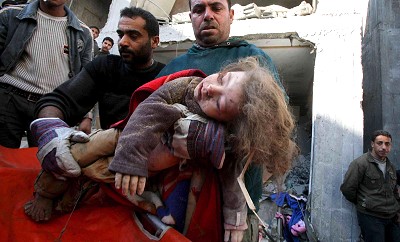
Threat of a Shoah being visited on the Gazan people was actually made by Israeli Deputy Defence Minister Vilnai in March 08. One wonders whether that indeed was when the recent massacre plan was concieved.
AUSTRALIAN Muslims are “seething with anger” at what they perceive as the Australian Government’s one-sided treatment of last month’s Israeli incursion into Gaza, a Melbourne leader said yesterday.
Ramzi Elsayed, president of the Islamic Council of Victoria, said he had never seen the community so hurt or aggrieved, especially after acting Prime Minister Julia Gillard said Israel was responding to Hamas aggression after Hamas broke the ceasefire.
“It’s as though they think one Jewish life is worth 100 Palestinians,” he said. “Enough’s enough. It’s time to call the facts as they are. Israel broke the ceasefire on 4 November.”
Responding to a Jewish threat to sever ties with Australia’s Muslims if the president of its peak body did not withdraw a comparison between Gaza and the Holocaust, Mr Elsayed said a cooling-off period was inevitable anyway.
“There’s going to be some open wounds which will take time to heal. Tension and hatred has built as never before in the Middle East, and that’s the danger in Australia.”
Mr Elsayed said the Victorian council would not have made the Holocaust comparison because they understood Jewish sensitivities, referring instead to the “massacre” of Palestinians.
Yesterday The Age reported a row between the Australian Federation of Islamic Councils and the Executive Council of Australian Jewry — the main bodies for each faith — over the refusal of AFIC chairman Ikebal Patel to recant his claim that the former victims of the Holocaust were perpetrating “much worse atrocities” in Gaza.
Robert Goot, president of the Jewish council, said the Jewish community would not be able to work with AFIC if the remarks were not withdrawn.
For a more realistic Australian Jewish perspective, read Sarah Dowse’s article from January 8. Dowse does not see the Gazan massacre and Hamas resistance in isolation from the travesties inflicted on the Palestinian people by the British and then Zionist occupation.
The massacre in Gaza has its roots in virulent European anti-Semitism and the 1917 Balfour declaration, when the British government promised Zionists that Jewish people would have a homeland in Palestine if Britain was victorious in World War I.
The key word here is homeland, and it should be remembered that the promise was qualified by the condition that such a homeland would “not be to the detriment” of the Palestinians. The steady increase in Jewish immigration under the British mandate provoked riots and protests, but Palestinians were still in majority until, in the aftermath of the Holocaust, the Zionists unilaterally declared an Israeli state.
Despite the suffering of the Palestinians, whose land was taken from them, for many years the sympathy of the developed world was with Israel, refuge for the survivors of the Nazi slaughter of European Jews, and beleaguered by surrounding hostile Arab states.
With the 1967 occupation of the West Bank and Gaza, Israel could no longer be accepted as a victim. Yet it has continued to play on the sympathies of Western governments, most particularly the US, and Jews of the diaspora. In reality, Israel has been a colonising state, masquerading as the most democratic, most humane, most modern nation in the region. It has served the Western powers to have such a proxy in the Middle East, and most recently, under the Bush Administration and in concert with the Israelis, they have played a cynical game of divide and rule, encouraging the Israelis in their blind refusal to negotiate with Hamas, just as for years Israel refused to negotiate with the Palestine Liberation Organisation, the forerunners of Fatah, whom they now support.
Hamas is not a terrorist organisation, but the legitimate, democratically elected government of the Palestinian Authority. We may not like what it stands for, but that is no reason for sidelining it. Undermining that government by Israel and the West is but one of a string of cynical actions on their part.
The rationale that Hamas has refused to accept Israel’s existence or to eschew violence is yet another example of how the truth has been twisted. What Hamas rejected was the continued, barbaric Israeli occupation of the West Bank, and the laying down of arms against an aggressive military occupation. I have heard with my own ears the Hamas Prime Minister, Ismail Haniyeh, say exactly that. Is he to be trusted? It would have been worth a try.
And who now would trust Israel?
So here we have it: a tough, technocratically savvy, nuclear power with the backing of the largest military power the world has known, bombing, then invading, a territory the size of a small city, with a population of 1.5 million, most of whom are civilians, to “defend our citizens”.
The ceasefire was meant to lift the Israeli blockade on Gaza, but it didn’t. It was meant to facilitate the release of Palestinian prisoners, many of whom were members of the elected Hamas Government, but it didn’t.
Israeli planes raided southern Gaza in November. The Hamas rockets continued. Which side broke the ceasefire? Hamas may not be blameless, but the situation is far more complex than Israel claims. The fact that more than 600 people have died because in a couple of weeks the US will have a new government and next month Israel will have an election, is the most shocking form of cynicism the Palestinian people have yet faced.
Since the 2006 invasion of Lebanon I have undergone what for me, as a Jew, has been an agonising realignment of my feelings about Israel. I have come to believe that a specifically Jewish state has been a terrible mistake.

A recent Palestine Chronicle article by Dina Jadallah-Taschler encapsulates the problem and analyses the false dichotomies presented by the western media:
Without an acknowledgement of injustice, there is no truth in balanced competing narratives. Without it, there will be no solutions, no rights, and no peace.
The simple fact is that Israel usurped Palestinians rights. It continues to do them a supreme injustice through the occupation and now war. All else derives from this. Therefore, when a report purports to be objective and presents the conflict between Israel and the Palestinians as one of competing narratives, both of which are equally legitimate, this only serves to preserve the original imbalance of power distribution and injustice. There is a complicity in crime, in a lot of balanced reporting.
For those that are sentimental about their attachments to such balanced presentations, it is sometimes helpful to substitute other competing groups and see how well those arguments hold up. As examples, how just is it to assign equal legitimacy to the claims of slave-owners versus slaves and abolitionists; apartheid versus anti-apartheid groups; misogynist Wahhabi clerics versus women; colonialists versus colonized? Historically, in each of these cases, narratives were presented in defense of these now-indefensible positions. Religions, civilizational “white man’s burden” arguments, and traditions were called forth to buttress pre-existing uneven distributions of power so as to perpetuate them. Those who resisted were always branded as ignorant, deluded, uppity, terrorist and so forth. This is not all just historical relic. Let us not forget that until as late as April of 2008, Nelson Mandela was flagged a “terrorist” on US anti-terrorism watch lists. He had been designated as such for having dared to fight apartheid. (1) Similar tactical arguments were used by the French in Algeria, the British in India, Ireland, Kenya, and the Conquistadors against the Native peoples of the New World, to name a few.
Dinah examines the realities of the choices in the Israeli election this week and finds
Conveniently, Western “balanced” reporting ignores some decidedly unbalanced facts.
For one, the Likud Party Charter and platform does not recognize a Palestinian state. It specifically states that the settlements are “the realization of Zionist values” and that it will “prevent their uprooting.” It goes on to say that “The Government of Israel flatly rejects the establishment of a Palestinian Arab state west of the Jordan river. The Palestinians can run their lives freely in the framework of self-rule, but not as an independent and sovereign state.” Contrast this with the excoriation of Hamas for not recognizing “Israel’s right to exist.” Similarly, Lieberman’s vitriolic invective against Arabs and Palestinians, both inside and outside Israel, is inheritor of Meir Kahane’s racist enterprise. His advocacy of “transferring” Palestinian citizens of Israel and his vociferous rejection of creating a Palestinian state indicates that what was once fringe has now become mainstream. (7) Credit for this is due to balanced competing narratives discourse, which has effectively lumped all Israelis into the “good” camp opposing the Axis of Evil.
Another discursive myth is Israel’s “most moral army in the world.” The attack on Gaza revealed the IDF valiantly “winning” by massacring hundreds of defenseless women and children. Amnesty International reported that the IDF also engaged in such “professional” behavior as the use of white phosphorus to incinerate civilians, the bombing of UNRWA schools where refugees were seeking shelter, and the looting and desecration (sometimes even with excrement) of Gazans’ homes. The Palestinian Authority estimates the material extent of the damage at $2 billion.
The examples discussed above demonstrate clearly how balanced talk can hide a reality of injustice and a project for its perpetuation. But the secret ugly truth remains. Its repercussions are not limited to continued Palestinian resistance and demands for freedom. Proof is also evident on the flip side of that coin. Israel, the “fair,” the “moderate,” the “peace-loving,” the “good,” is now so afraid of the legal repercussions of their actions in Gaza, that they are now prohibiting the identification of the participants in the “war.” (8)
Negotiations for a truce with Israel will apparently continue on Sunday in Cairo.
The Israeli proposal Hamas received in Egypt “needs a lot of clarification,” said Hamas spokesman Fawzi Barhoum Friday.
Several articles are unclear and Hamas has presented questions to Egypt, who is meeting with Israeli negotiator Amos Gilad. One example, said Barhoum, is Israel’s proposed “partial lifting of the siege” which would leave 30% under Israeli control. There was also some issue over what parties would guarantee Israel’s compliance with the agreement.
Israeli media reported Friday evening that officials felt an agreement was close at hand. According to one source the agreement will include the full opening of Gaza’s border crossings with Israel and Egypt, though the latter will have Palestinian Authority security officials supervising the border.
The truce, according to the Israeli source, will have an 18-month duration with an option for renewal.
The Hamas delegation will arrive in Cairo Sunday, not Saturday as previously announced, and will review what Gilad has amended to the document. There has not been a final decision on the agreement, affirmed Barhoum, who blamed the delay on “Israeli arrogance.”
Elements of the reconstruction plan, however, have already been agreed on said the spokesman.
Reconstruction will take place in two stages, said Barhoum. “First allowing aid and heavy equipments to clean the debris in to the Gaza Strip,” and “opening roads and allowing prefab homes [to be transported into Gaza] for those displaced” during the war.
The second stage, he said, “is the total rebuilding of Gaza.” Hamas is ready to facilitate the work of all sides and has given its word that they will not obstruct efforts, and that the reconstruction should not be politicized.
Good reading:
Jim Rissman’s The Rewriting, Un-rewriting and Re-rewriting of History
Incidentally, if you had meant to read Fateful Triangle but never got around to it, now’s a good time, while the recent events are fresh in mind. The brunt of it takes place in 1981-1982, with the Palestine Liberation Organization taking the part of Hamas and Lebanon taking the part of Gaza. It’s all there, PLO/Hamas indicating it accepts a two-state solution and gaining legitimacy by adhering to a truce. Israel, threatened by this “peace offensive,” breaks the truce, provoking a violent PLO/Hamas response which provides Israel with the excuse for an invasion of Lebanon/Gaza. The U.S. political class and media parrot the Israeli propaganda, it has the right to self-defense, its army practices purity of arms while the PLO/Hamas cowardly hides among the civilian population, never mind that Operation Peace for Galilee/Sderot is really “the war to safeguard the occupation of the West Bank” (Chomsky, quoting Avner Yaniv/Zvi Ba’rel, Ha’aretz, Nov. 16, 2008; Johann Hari, The Independent, Dec. 29, 2008; Meron Benvenisti, Ha’aretz, Jan. 22, 2009). Yes, now’s a good time to read Fateful Triangle, “perhaps more than ever.”






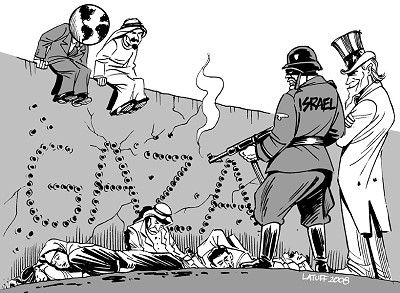
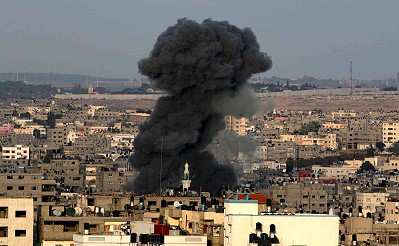
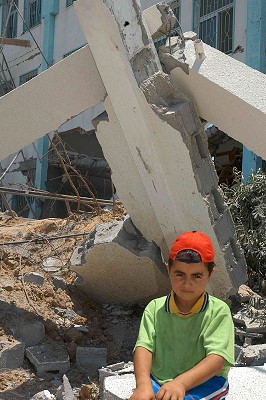

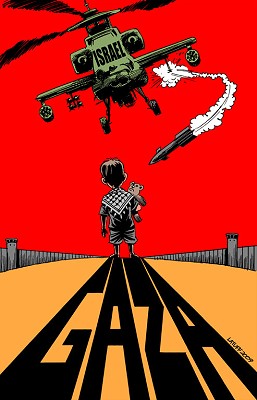
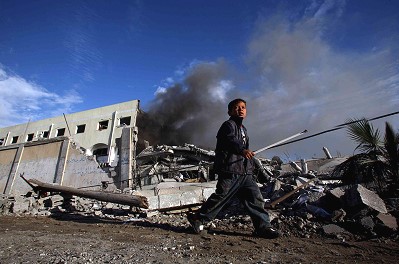

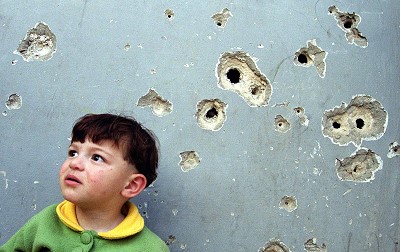
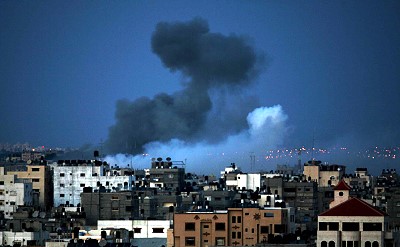 Someone needs to explain to Bibi that one dethrones monarchs, not democratically elected governments.
Someone needs to explain to Bibi that one dethrones monarchs, not democratically elected governments.